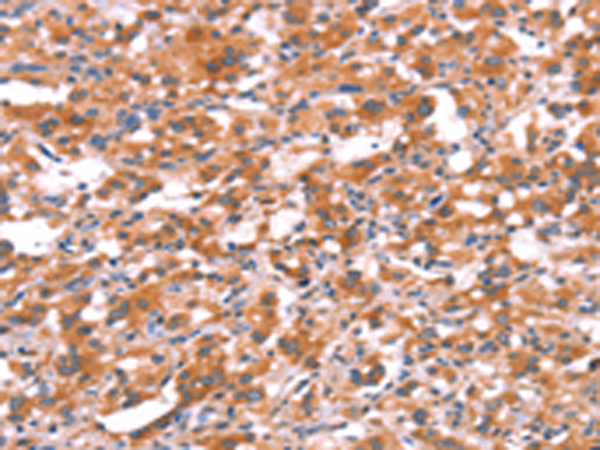

| WB | 咨询技术 | Human,Mouse,Rat |
| IF | 咨询技术 | Human,Mouse,Rat |
| IHC | 1/25-1/100 | Human,Mouse,Rat |
| ICC | 技术咨询 | Human,Mouse,Rat |
| FCM | 咨询技术 | Human,Mouse,Rat |
| Elisa | 1/2000-1/5000 | Human,Mouse,Rat |
| Aliases | CAE2; ECA2; GEFSP3 |
| WB Predicted band size | 54 kDa |
| Host/Isotype | Rabbit IgG |
| Antibody Type | Primary antibody |
| Storage | Store at 4°C short term. Aliquot and store at -20°C long term. Avoid freeze/thaw cycles. |
| Species Reactivity | Human, Mouse, Rat |
| Immunogen | Synthetic peptide of human GABRG2 |
| Formulation | Purified antibody in PBS with 0.05% sodium azide and 50% glycerol. |
+ +
以下是关于GABRG2抗体的3篇参考文献及其简要摘要:
1. **文献名称**:*GABAA receptor autoantibodies in patients with encephalitis and focal epilepsy*
**作者**:Petit-Pedrol, M., et al.
**摘要**:该研究报道了在部分自身免疫性脑炎及局灶性癫痫患者中检测到抗GABRG2抗体,发现这些抗体可破坏GABA能信号传导,导致神经元兴奋性增高及癫痫发作。
2. **文献名称**:*Antibodies to GABAA receptor γ2 subunit in autoimmune encephalitis*
**作者**:Ohkawa, T., et al.
**摘要**:研究揭示了GABRG2抗体在自身免疫性脑炎中的作用,通过动物模型证明抗体可减少突触GABA受体密度,引发认知障碍和癫痫样活动,部分患者对免疫治疗反应良好。
3. **文献名称**:*Pathogenic effects of anti-GABRG2 antibodies in a mouse model of epilepsy*
**作者**:Mikasova, L., et al.
**摘要**:该实验通过向小鼠脑内注射人源GABRG2抗体,观察到突触抑制功能受损及自发性癫痫发作,提示抗体直接参与癫痫发生机制。
**备注**:GABRG2抗体研究相对较少,部分文献可能同时涉及GABA-A受体其他亚基(如α1/β3),建议结合具体需求进一步筛选。
The GABRG2 antibody targets the gamma-2 subunit (γ2) of the gamma-aminobutyric acid type A (GABAₐ) receptor, a critical ligand-gated chloride channel mediating inhibitory neurotransmission in the central nervous system. GABAₐ receptors are pentameric complexes, and the γ2 subunit, encoded by the GABRG2 gene, is essential for synaptic clustering, receptor trafficking, and benzodiazepine sensitivity. Autoantibodies against GABRG2 are rare but increasingly recognized in autoimmune encephalitis, often associated with seizures, cognitive decline, and psychiatric symptoms. These antibodies may disrupt GABAergic signaling by internalizing receptors or interfering with their function, leading to hyperexcitability and neuropsychiatric manifestations.
GABRG2-related autoimmunity is frequently detected alongside antibodies to other GABAₐ receptor subunits (e.g., α1. β3), complicating clinical characterization. Cases often respond to immunotherapies like corticosteroids, intravenous immunoglobulins, or rituximab, though residual deficits may persist. Beyond autoimmunity, GABRG2 germline mutations are linked to genetic epilepsy syndromes, such as Dravet syndrome and genetic epilepsy with febrile seizures plus (GEFS+), highlighting the subunit's broader role in neuronal excitability. Research continues to explore how GABRG2 antibodies contribute to disease mechanisms and whether their presence correlates with specific clinical phenotypes or treatment outcomes.
×